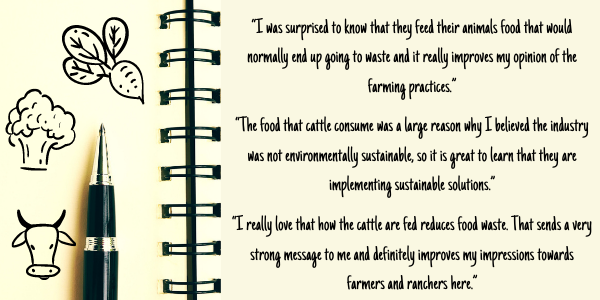Source: Canadian Beef Check-Off Agency
Food waste is a key focus of both national and international climate change discussions with the Government of Canada announcing its Food Waste Reduction Challenge in 2020. Over half of the food produced in Canada never makes it to our plates, with the largest percentage of waste coming at the consumption level. Reducing food waste is also the most common food goal with consumers, identified by 90% of Canadians as something they are actively doing or trying to do.
It is common practice in the beef industry to upcycle food loss and waste into high quality feed for cattle. This includes crops damaged by weather or pests (which was demonstrated through drought, smoke, and grasshoppers in 2021) all the way to non-retail quality food items from grocery stores and the by-products of brewing. Not only is this demonstrating the circular economy present in agriculture, but it also represents huge amounts of products being diverted from the landfill. From the Hall and White study in 2017, it was determined that cattle utilize 43 billion kgs of food waste per year in the US. The Public and Stakeholder Engagement (PSE) team set out to determine how Canadians felt about the role of cattle in diverting food waste.
A large online focus group was conducted in July 2021. A representative sample of Canadians was chosen and then oversampled for women under 45, which prior research shows is the demographic most concerned about the environmental impact of eating beef. Participants were first asked questions about their perceptions of the beef industry and farmers and ranchers. These were consistent with previous research conducted by PSE. Canadians do not know much about how beef cattle are raised but many have heard about potential environmental impacts. However, most Canadians feel that farmers and ranchers themselves are doing a good job taking care of the land and animals in their care. This demonstrates how trust for communications coming from ‘industry’ vs individuals raising beef cattle and highlights how important it is to have producers front and centre in public facing campaigns.
Participants were then shown social media and video content highlighting how cattle can utilize both waste products from brewing as well as grocery shrink. Ads instantly appealed as something surprising and new, especially among urban participants who lack awareness and knowledge about raising beef cattle and many wondered why they had not seen this information before.
“I was surprised to know that they feed their animals food that would normally end up going to waste and it really improves my opinion of the farming practices.”
“The food that cattle consume was a large reason why I believed the industry was not environmentally sustainable, so it is great to learn that they are implementing sustainable solutions.”
“I really love that how the cattle are fed reduces food waste. That sends a very strong message to me and definitely improves my impressions towards farmers and ranchers here.”

When asked what the main message of the ads were, participants said:
- “That cattle are fed good food (contrary to what may otherwise be shown in some popular documentaries) and that this process helps reduce food waste in Canada.
- “That all the food doesn’t go to waste and is fed to cattle. I think the ad is very believable and makes you look differently at the cattle industry.
Finally, participants were asked to choose which key message resonated with them more, specifically about cattle in feedlots. The first was on how feedlots reduce the amount of resources required and the second was how feedlots play an integral role in reducing food waste. 76% of participants identified the food waste key message as more personally relevant to them. Reasons for this included reducing food waste is a universal concept, something Canadians are doing in their own homes, and connects humans to cattle. Overall, no major concerns were identified with connecting cattle to food waste seen as positive by consumers and improves their impressions about the industry and its efforts to reduce impacts.
Amie Peck, Stakeholder Engagement Manager, presented the findings of this research in September. A recording of this presentation can be found here.









